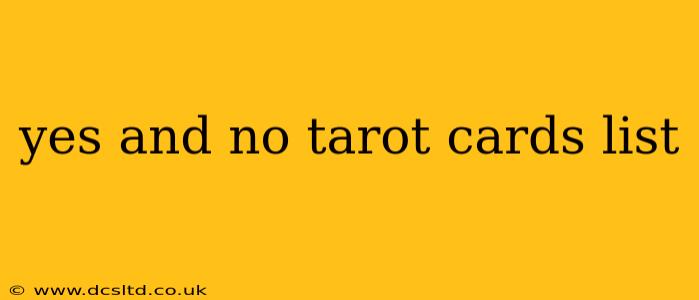The Tarot, a captivating system of symbolism, often presents seemingly contradictory answers. While not explicitly labeled "yes" or "no," certain cards strongly suggest affirmation or negation. This guide will explore cards commonly interpreted as definitive "yes" or "no" responses, highlighting nuances crucial for accurate readings. Remember, context is king! The surrounding cards and the question's specifics significantly impact interpretation.
Cards Often Associated with a "Yes" Response
Several cards resonate with positive affirmation, indicating a likely "yes" answer to your question. However, the strength of this "yes" can vary depending on the overall spread.
-
The Sun: This card radiates positivity, joy, and success. A resounding "yes," it points to clear skies and favorable outcomes. The Sun rarely signifies a hesitant or conditional yes; it's usually a powerful affirmation.
-
The Lovers: This card signifies harmony, balance, and successful unions. While not always a direct "yes" to every question, within the context of relationships, choices, or partnerships, it typically leans towards a positive outcome.
-
The Star: Hope, faith, and optimism are central to this card. A "yes" tinged with the need for patience and belief in the process. The outcome is positive but might require time and trust.
-
Three of Cups: Celebration, joy, and fulfilled desires often accompany this card. A strong "yes" related to social gatherings, friendship, and shared experiences.
-
Ace of Cups: New beginnings, emotional fulfillment, and abundance characterize this card. A "yes" indicating a positive start or a new opportunity leading to a positive resolution.
-
Ten of Pentacles: This card speaks of long-term stability, financial security, and family harmony. A "yes" suggesting a lasting and positive outcome, especially concerning material matters.
Cards Often Associated with a "No" Response
These cards frequently indicate a negative or challenging response to your question. Again, the surrounding cards and the question’s context heavily influence the interpretation.
-
The Tower: Sudden upheaval, destruction, and unexpected change are associated with this card. A resounding "no" often indicating a need to adapt to unforeseen circumstances. It doesn't necessarily mean complete failure, but it rarely signifies a straightforward "yes."
-
The Three of Swords: Heartbreak, sorrow, and betrayal are themes linked to this card. Often a "no" highlighting emotional pain and potential relationship difficulties.
-
Five of Pentacles: Poverty, lack, and despair are prominent themes. A "no" signifying a difficult financial situation or a lack of resources.
-
Ten of Swords: Betrayal, defeat, and suffering are central to this card. A definitive "no" suggesting significant hardship and potential setbacks.
-
The Moon: Illusion, deception, and uncertainty define this card. A "no" indicating confusion, hidden truths, or a path filled with obstacles and uncertainty. It might suggest the answer isn't clear-cut yet or that the question needs re-evaluation.
-
Eight of Swords: Feeling trapped, limited, and restricted are common associations. A "no" suggesting self-imposed limitations or external constraints preventing progress.
Cards That Offer Uncertain or Conditional Answers
Some cards offer neither a clear "yes" nor "no," instead presenting a nuanced perspective requiring deeper consideration.
-
The Chariot: Victory through perseverance. While potential for success exists, effort and determination are essential. The answer isn't a straightforward "yes" or "no" but depends on your actions.
-
The Wheel of Fortune: Change, destiny, and cyclical patterns are key themes. The answer depends on the current phase of your life's cycle; the "yes" or "no" is not inherent to the card itself but a result of where you are on the wheel.
-
The Hermit: Introspection, wisdom, and solitude. The answer might be "no" for now, suggesting a need for self-reflection and more time to assess before acting.
How to Interpret "Yes" and "No" in a Tarot Spread
Remember, the Tarot isn't a fortune-telling machine offering simple "yes" or "no" answers. The cards offer guidance, insight, and potential paths. The cards listed above offer a general guideline; a skilled reader assesses the entire spread's context to provide a comprehensive interpretation. Focus on the overall message rather than fixating on individual card interpretations.
Frequently Asked Questions
What are some other cards that could indicate a "yes"?
While the cards listed above are common indicators, several other cards can suggest a positive answer depending on the context of your reading. Cards like the Empress (abundance, nurturing), the Emperor (structure, control), and the Justice (balance, fairness) can all suggest a "yes" in the right circumstances.
What about the Major Arcana? Are all Major Arcana cards a "yes"?
Not at all! The Major Arcana cards carry powerful energies and represent significant life events or archetypes. Cards like Death (transformation), The Devil (temptation, bondage), and The Tower (sudden change) often suggest challenges or obstacles, indicating a "no" or a need for significant adaptation.
Is it possible to get a reversed card that changes the meaning to "yes" or "no"?
Yes, reversed cards frequently shift the meaning. A reversed Sun might suggest obstacles hindering joy, while a reversed Tower may mean avoiding an impending collapse. However, interpretations of reversed cards vary among readers.
This guide offers a starting point for understanding how certain Tarot cards might suggest "yes" or "no" answers. Always remember that the Tarot is a tool for self-reflection and insight, providing guidance, not definitive predictions. Consult a professional Tarot reader for deeper and more personalized interpretations.
